|
|
|
Sort Order |
|
|
|
Items / Page
|
|
|
|
|
|
|
| Srl | Item |
| 1 |
ID:
120760
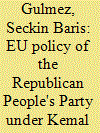

|
|
|
|
|
| Publication |
2013.
|
| Summary/Abstract |
This article scrutinizes the determinants of the European Union (EU) policy of the Republican People's Party (CHP), the main opposition party in Turkey under the leadership of Kiliçdaroglu. Critically discussing the role of party ideology concerning attitudes toward EU accession, the article examines whether the CHP's ideology changed after Kiliçdaroglu and if so, how this ideological shift affected the party's euroskeptic stance. The article overall argues that the leadership change enabled the party to withdraw its nationalistic stance and embrace a social democratic rhetoric. However, the article contends that such transformation had little effect on its euroskepticism due to the persisting endogenous (the Justice and Development Party's authoritarianism) and exogenous factors (the EU's additional conditionality) that constrain the new CHP's EU-enthusiasm.
|
|
|
|
|
|
|
|
|
|
|
|
|
|
|
|
| 2 |
ID:
120759


|
|
|
|
|
| Publication |
2013.
|
| Summary/Abstract |
This article examines the intellectual efforts in Turkey aiming at hegemonizing conservative democracy by diversifying and deepening its equivocal content vis-à-vis challenging alternatives. While globally acclaimed as an evidence of the compatibility of Islam and democracy, this article will try to show that, the real test is whether the Muslim circles will be able to overcome the limits of conservative democracy for a full-fledged democratization. Only then it is possible to build new discourses internalizing the diversity and hybridity of Turkey that is a sine qua non for the consolidation of democracy.
|
|
|
|
|
|
|
|
|
|
|
|
|
|
|
|
| 3 |
ID:
120761
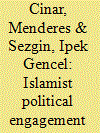

|
|
|
|
|
| Publication |
2013.
|
| Summary/Abstract |
This study examines what has been overlooked by most studies of Islamist activism in the early years of the multi-party politics (1945-60) in Turkey. By examining the formal and informal political institutions, power relations and practices, it reveals that the early Islamists did not remain content with only socio-cultural activities. They effectively and creatively engaged with and within the political field, enjoyed an impact disproportionate to their actual numbers and power, and set the parameters for future Islamist activism. In so doing, they reproduced the Republican orthodoxy while advancing their heterodox claims.
|
|
|
|
|
|
|
|
|
|
|
|
|
|
|
|
| 4 |
ID:
120764
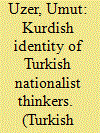

|
|
|
|
|
| Publication |
2013.
|
| Summary/Abstract |
This article purports to study the national identity of two influential ideologues of Turkish nationalism, Ziya Gökalp and Ahmet Arvasi, their approach to Kurds and their rejection of such affiliations regardless of their background in a predominantly Kurdish milieu. Their worldviews were strikingly different regarding social matters but they both shared a common view regarding the hegemonic position of Turkish identity even in a Kurdish-majority region.
|
|
|
|
|
|
|
|
|
|
|
|
|
|
|
|
| 5 |
ID:
120763


|
|
|
|
|
| Publication |
2013.
|
| Summary/Abstract |
In the period from 1923 to 1946, the new regime was consolidated through a series of radical secularizing reforms. In order to make these reforms acceptable to a wider public, the new Republic tried to build a secular Turkish identity that does not include Islam. High school history textbooks were prepared to this end in 1931. It has generally been argued that the transition to a multi-party regime constituted a break by opening greater space for religion in society. However, the Kemalist Project to develop a secular Turkish identity without Islam ended in 1942, i.e. during the single-party rule of the Republican People's Party (RPP). The reasons behind this change show that the RPP was a more heterogeneous party in terms of the views of its policy-makers on religion.
|
|
|
|
|
|
|
|
|
|
|
|
|
|
|
|
| 6 |
ID:
120755


|
|
|
|
|
| Publication |
2013.
|
| Summary/Abstract |
This article aims to make a contribution to the axis-shift debate by quantitatively analyzing whether Turkey's United Nations General Assembly (UNGA) votes displayed any shifting patterns from the West to the East during the Justice and Development Party (AKP) government era. Examining data on the UNGA's most important resolutions from 2000 to 2010, the article finds no evidence supporting the axis-shift claim. However, there is some empirical evidence indicating that Turkey, at least in the UNGA, became a more independent actor on regional issues but at the same time adopted a more pro-European Union attitude on global issues during the AKP era.
|
|
|
|
|
|
|
|
|
|
|
|
|
|
|
|
| 7 |
ID:
120762


|
|
|
|
|
| Publication |
2013.
|
| Summary/Abstract |
Turkish Foreign Policy (FP) has seen a paradigmatic transformation. This study presents a comparative analysis of 1535 articles, written by more than a hundred columnists and published in ten Turkish newspapers between June 2008 and June 2011. Results show a strong polarization of opinion such that articles with realist theoretical stance are highly likely to be critical of the Justice and Development Party's (AKP) FP for Turkey, whereas articles with liberal and constructivist theoretical stance are highly likely to have pro-government positioning. In this close association, the question is whether attitude to government policy precedes or follows theoretical stance. Results suggest that newspapers employ mostly whatever theory will support their stance for or against the AKP's new-era FP. In addition, results suggest little attention to Turkey's bid for European Union membership and little attention to world problems outside the Middle East.
|
|
|
|
|
|
|
|
|
|
|
|
|
|
|
|
| 8 |
ID:
120758


|
|
|
|
|
| Publication |
2013.
|
| Summary/Abstract |
This article explores the concept of identity in Turkey and how issues associated with it influence Turkish relations with European states, societies, and the European Union (EU). Turkey's internal diversity is often overlooked in favor of more monolithic representations. This diversity has positive and negative dimensions for governance in Turkey and for forces wanting to maintain or regenerate momentum for accession to the EU. In comparison, EUrope is struggling to create a common identity of its own. For some Europeans, Turkey is an external unifier. Although the salience of Turkey-EUrope relations has been relatively muted as the debt crisis overwhelms other political themes, the possibility of Turkey joining the EU stimulates identity-related concerns as much as others about financial transfers.
|
|
|
|
|
|
|
|
|
|
|
|
|
|
|
|
| 9 |
ID:
120756
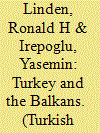

|
|
|
|
|
| Publication |
2013.
|
| Summary/Abstract |
This article analyzes recent Turkish activism in the Balkans from the standpoint of political community. Drawing on but expanding Karl Deutsch's original concept allows us to explore the goals and actions of Turkish policy in the region. Multiple overlapping communities, some embryonic, can be seen to frame Turkish action. These include cultural/ethnic, security, European Union (EU) candidate, EU alternative, business and Islamic communities. Viewing Turkish policies this way offers analytical leverage that highlights the aims and dynamics of Turkish policies as well as possible outcomes of Turkish foreign policy actions in the Balkans.
|
|
|
|
|
|
|
|
|
|
|
|
|
|
|
|
| 10 |
ID:
120757
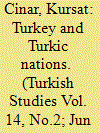

|
|
|
|
|
| Publication |
2013.
|
| Summary/Abstract |
Turkish foreign policy has experienced massive alterations after the end of Cold War. This has been most evident in Turkey's relations with Turkic nations in Central Asia and the Caucasus, all of which gained independence from the USSR. This article aims to provide a thorough analysis on this issue. First, the article explores the ethnicity concept and applies it to the relations between Turkey and Turkic nations. Then, it examines Turkey's relations with other regional and international powers, namely Russia, the USA, and Iran, through the lenses of Central Asia and the Caucasia. Finally, the article questions the often monolithic view of Turkic nations in the eyes of the Turkish public and delves into the rich yet diverse bilateral relations between Turkey and each Turkic state. To this end, it analyzes Turkey's political, economic, and cultural ties with Azerbaijan, Kazakhstan, Kyrgyzstan, Turkmenistan, and Uzbekistan. Carefully going over all of these subjects, the article intends to illustrate the multifaceted nature of Turkey's relations with Turkic nations and the prospects and obstacles ahead.
|
|
|
|
|
|
|
|
|
|
|
|
|
|
|
|
| 11 |
ID:
120754


|
|
|
|
|
| Publication |
2013.
|
| Summary/Abstract |
There were huge expectations that Turkish-American bilateral relations would be improved during Obama's office term. Obama's coming to the office as president raised hopes for further cooperation because of common interests and vision in strategic matters particularly those relevant to the Middle East. However, the expectations have gone unfulfilled due to mutual mistakes that could have been avoided provided that greater attention had been paid to the regional developments. Despite occasional deterioration in the bilateral ties, there is still huge potential in the relations between Turkey and the USA in case the parties act prudently and wisely in the nascent regional political setting.
|
|
|
|
|
|
|
|
|
|
|
|
|
|
|
|
|
|
|
|
|